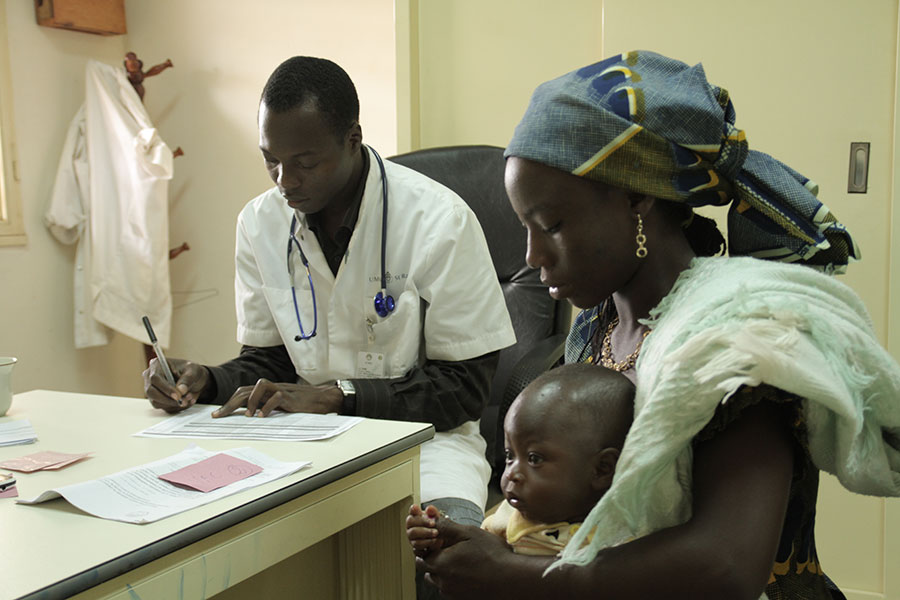Diseases do not stop at borders. Deadly epidemics such as Ebola and COVID-19 can become pandemics, the spread of antibiotic‐resistant bacteria has become a global challenge and noninfectious diseases like diabetes are on the rise. Ensuring healthy lives and promoting well‐being for all (UN SDG 3) is thus a mission that must be tackled in international cooperation. Collaborative global efforts are needed to fight and prevent disease.

Alexandra Longuet
Access to health care and the protection against the risk of contracting a disease are fundamentals for social development and the fight against poverty. Vaccines, drugs and other medical equipment, however, are often either unavailable or unaffordable for many people especially in low‐ and middle income countries (LMICs). Global Health deals with questions such as: How are diseases diagnosed? How can diseases be treated? What can be done to strengthen health care systems sustainably?
A global challenge
Countries across the globe face similar challenges: demographic shifts, the rise of chronic conditions, antibiotic‐resistances, and the threat caused by deadly epidemics. As the poorest populations suffer disproportionately, there is an urgent need to develop strategies, medications and vaccines to combat poverty‐related and neglected diseases and stop premature and preventable deaths. Yet owing to only minor profitability, research‐driven pharmaceutical companies usually show limited interest in developing pharmaceuticals for the poor. Without accessible and affordable cures, diseases are turned into neglected diseases and disadvantaged individuals are turned into neglected patients. To change this situation is a global challenge. One step towards change is public funding of research.
A strong German national research community is the basis for successful international cooperation using the One Health approach
The German Federal Ministry of Education and Research (BMBF) issues project funding at the national level to initiate new projects with the One Health approach. One Health is an integrated, unifying approach to balance and optimize the health of people, animals and the environment. One Health involves the human health, veterinary, public health and environmental sectors. The One Health approach is particularly relevant for the control of zoonoses (diseases that can spread between animals and humans), the combat against antimicrobial resistance and the protection of food and water safety.
In order to initiate these projects and networking between the relevant experts form the different disciplines such as human medicine, veterinary medicine, environmental sciences and public health BMBF also funds the Research Platform on One Health.
Further information: German Research Platform for Zoonoses
At an institutional level, the German Center for Infection Research (DZIF), set up by the BMBF and the Federal States, focuses on pressing issues of infection research. In the field of neglected and poverty‐related diseases, these are primarily malaria, AIDS and tuberculosis which are also tackled in cooperation with African partner institutes.
Further information: DZIF -German Center for Infection Research
Germany is taking responsibility
Public funding can contribute to progresses in Global Health significantly through targeted research and development efforts in cooperation with affected countries. At the same time, high‐income countries can help to strengthen under‐resourced health systems, so that medical innovations can reach the people who need it most. The BMBF is therefore participating in several international cooperations bundling material, financial and intellectual resources. Germany is taking the responsibility to address the health problems of the world’s poorest.
International efforts for Global Health
Challenges in Global Health require transnational efforts – both at European and global level. Germany moved Global Health issues into the international spotlight during its G7 and G20 presidencies. In its G7 presidency 2022, Germany made (1) global pandemic prevention, preparedness and response (PPPR), (2) tackling the “silent pandemic” of antimicrobial resistance (AMR), and (3) Climate resilient and sustainable, climate-neutral health systems, three of the top priorities.
In line with Germany’s engagement, BMBF has set up or participates in a variety of measures and initiatives in the area of Global Health. These comprise, for example, initiatives on AMR, epidemic preparedness, clinical trial partnerships and others. The aim of these initiatives is to support international research activities, with a special focus on Sub‐Saharan African countries.
For more information on these measures, please follow the tiles below.